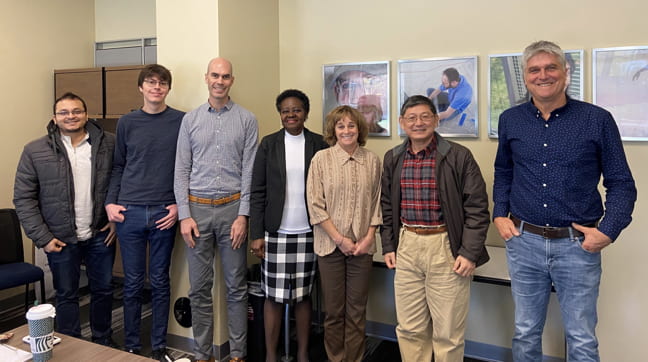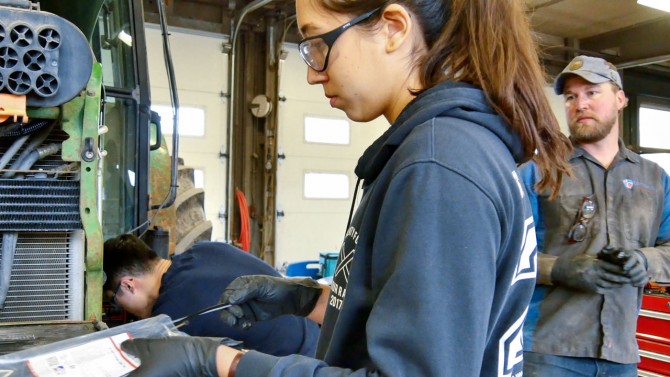Cornell farm tractor gets clean, green biodiesel makeover

By Blaine Friedlander
A week before the Ithaca campus shut down due to the COVID-19 pandemic, members of an engineering student group converted a university-owned diesel tractor into a clean, green farming machine.
Instead of emitting the notoriously noxious black diesel smoke, the tractor now emits a much lighter colored exhaust with a smell more reminiscent of French fries than farm implements. That’s thanks to its soy-based biodiesel fuel, as the updated tractor helps the university take another step toward its goal of carbon neutrality by 2035.
“A carbon-neutral campus is an inspiring vision,” said H. Oliver Gao, professor of engineering and director of Cornell’s Center for Transportation, Environment and Community Health, which helped create the project. “This was a good opportunity to engage engineering students, to gain hands-on experience, in a Cornell Living Laboratory project.”
As Jared Hibshman ’19 helped to set up the project last year, members of the Engineers for a Sustainable World group – Gregory Brumberg ’21, Lawrence Li ’21, Sophia Openshaw ’23, Sai Mallipedhi ’21 and Ian Starnes ’20 – spent the first weekend in March converting the 2005 John Deere 6715 tractor in the Farm Service Shop, operated by Cornell’s College of Agriculture and Life Sciences, and Cornell’s Ithaca Agricultural Experiment Station. The tractor is used in the university’s compost operation and for agricultural research support.
The biodiesel tank and its fuel-switching kit – called the Vector System – was developed by Optimus Technologies, a Pittsburgh startup that makes biodiesel conversion systems for medium- and heavy-duty trucks. This was the company’s first conversion of a tractor; Jonathan Ewing, Optimus’ engineering manager, joined the students to supervise the system’s installation.
Biodiesel fuel can gel or solidify in cold weather, but the Vector System is designed to reduce the problem. The engine starts with traditional diesel, and as the engine warms, heat is delivered via the coolant system to the biodiesel fuel in a separate tank. The engine will automatically switch from diesel to biodiesel, once this renewable fuel reaches a specified temperature.
The Vector System bolts onto the engine area, reducing modification costs, and enables the tractor to run on new clean fuels as they become available.
Another biodiesel benefit: breathing easy. Because the tractor uses a soy-based biodiesel, Ewing said, there is 60% to 70% reduction in particulate matter, with the same energy efficiency as diesel. The use of biodiesel may reduce up to 80% of carbon emissions into the atmosphere, he said.
The project started three years ago with an email from John Swanson ’61, B.M.E. ’62, M.S. ’63, to Lance Collins, the J. Silbert Dean of Engineering. Swanson suggested that one step toward a carbon-neutral campus would be to convert diesel vehicles into those run on biodiesel.
Collins contacted Gao, who consulted Francis Vanek, senior lecturer in civil and environmental engineering and faculty adviser to Engineers for a Sustainable World. The project took about two years to plan and two semesters to execute. Swanson funded the project; Optimus provided the system.
“Installing the system provided a valuable opportunity to execute a project and the critical experience of bringing it to fruition,” Brumberg said. The students expect to conduct emissions tests when campus reopens.
“For the university, the year 2035 is not far away,” Gao said. “We are engaging and training our students today so that they can contribute now to Cornell’s carbon-neutral future.”
NewYork-Presbyterian Shares COVID-19 Dashboard for Hospital Use – Webconference
This webinar takes place on Friday, May 1, 2020 from 1-2 p.m. (ET)
HANYS is pleased to share NewYork-Presbyterian and Weill Cornell Medicine/Cornell University’s new COVID-19 dashboard, implemented to track data and provide timely operational and quality information to the emergency department staff. The program, which will be available to New York hospitals, is flexible and can easily be modified for other information and priorities.
Registration is open to HANYS Members and Non Members.
This effort was partially supported by CTECH, if interested in the webinar, please use the link below to register.
Objectives for this session include:
This webinar presents a demonstration of a data visualization dashboard that can help augment your hospital’s current system with more real-time practice information. This resource will be available for New York hospitals, and steps for software installation and deployment will be described in the webinar. Registration for the software and NewYork-Presbyterian/Weill Cornell Medicine support will be available at the end of the session to assist in producing a dashboard tailored to your department and hospital.
Presenters:
Yiye Zhang, PhD, MS, Assistant Professor, Department of Population Health Sciences, Weill Cornell Medicine
yiz2014@med.cornell.edu (646) 962-9437
Joel Park, MD, MS, FACEP, Assistant Professor of Clinical Emergency Medicine, NewYork-Presbyterian Hospital/Weill Cornell Medicine,jcp9010@cornell.med.edu (646) 990-9922
Dona Alma Bou Eid, MHA, Data Analytics Specialist, Department of Emergency Medicine, Weill Cornell Medicine, dob2018@cornell.med.edu(212) 746-0780
Peter A. D. Steel, MBBS, MA, Director of Clinical Services, Assistant Professor of Clinical Emergency Medicine, NewYork-Presbyterian/Weill Cornell Medicine, pes9027@cornell.medu.edu (212) 746-0780
Continuing Education Credits
There are no continuing education credits associated with this webinar. If you have questions regarding registration please contact Registration Support at learning@hanys.org or at (518) 431-7867.
Yiye Zhang, Ph.D., M.S.
Assistant Professor, Division of Health Informatics
Program Director, MS Program in Health Informatics
Course Director, Continuing Medical Education in Healthcare Policy and Research
https://www.yiyezhang.com/
Weill Cornell Medicine | Cornell University
Healthcare Policy & Research
425 East 61st Street, New York, NY 10065
646.962.9437
CTECH Awards the 2020 CTECH Ph.D. Dissertation to Cornell Grad Student
Anne M. Burton was awarded Cornell’s 2020 CTECH Ph.D. Dissertation Award. She is working towards her Ph.D. in Economics with Professor John Cawley. Her dissertation title is “Do Uber and Lyft Reduce Drunk Driving Fatalities?” The project investigates whether Uber and Lyft lead to reductions in drunk driving, as measured by city-level drunk-driver-related motor vehicle fatalities and fatal crashes. She is using a difference-in-differences method that exploits the variation in the timing of Uber and Lyft entry for the 100 most populous U.S. cities. Using monthly city-level Fatality Analysis Reporting System (FARS) data for 2006 to 2016, she finds that Lyft and Uber lead to a statistically significant reduction in nighttime drunk-driver-related fatal motor vehicle incidents. This effect appears to be driven by reductions in incidents several years after the entry of Uber or Lyft into a city, consistent with a lagged adoption of this new transportation technology by riders.

Pictured in the photo are Anne M. Burton and Professor John Cawley.
UC Davis students and faculty meet with the California Department of Public Health’s Injury and Violence Prevention
December 16, 2019
Drs. H. Michael Zhang and Fraser Shilling, along with Ph.D. and M.S. students Rafee Musabbir and Justin Darr, respectively, met with representatives from the California Department of Public Health’s Injury and Violence Prevention (IV) Branch, formerly the Safe and Active Communities Branch, Orion Stewart, Ph.D. Research Scientist II, Program Researcher, Nana Tufuoh, M.D., M.P.H., Research Scientist III, Program Researcher, and Marianne Hernandez, M.S. Health Program Specialist. The purpose of the meeting was to learn more about both the Comprehensive Metric to Evaluate the Impacts of Transportation and Environment on Community Health project and the Crash Medical Outcomes Data (CMOD) project to explore possible overlap opportunities to further each other’s goals.
There is a possible collaboration related to traffic injury and fatality datasets the department has assembled and uses to study health impacts of traffic crashes. Fraser Shilling’s work with the UC Davis Medical Center to develop end-to-end informatics solutions, from traffic to health outcomes, was also discussed. Dr. Shilling is with the UC Davis National Center of Sustainable Transportation as well as a CTECH researcher. The San Francisco Vision Zero project is working towards similar ends by linking crash data to medical data.

Photo from left to right:
Rafee Musabbir, Justin Darr, Orion Stewart, Nana Tufuoh, Marianne Hernandez, Michael Zhang, Fraser Shilling
